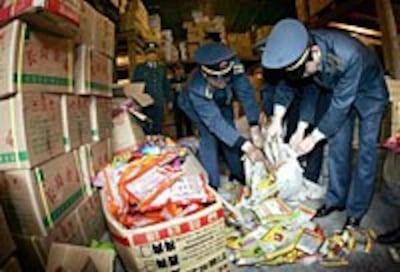
China is likely to face serious trade consequences if it responds to product safety complaints by retaliating against U.S. imports, analysts say.
Complaints about the safety of Chinese exports have been rising since April, when problems with adulterated pet food in North America were traced to chemicals sold in China. Since then, more Chinese products have been found to contain toxic or unapproved substances, including toothpaste, toys, pharmaceuticals, and fish.
The wave of problems with Chinese products has prompted calls inside the United States for tougher regulations and inspections of imports.
On July 13, China’s General Administration of Quality Supervision, Inspection, and Quarantine (CAGSIQ) blocked chicken and pork products from seven U.S. food producers, citing problems including salmonella and the presence of feed additives and veterinary drugs.
The agency also said it had found a shipment of U.S.-made protein powder containing excessive amounts of selenium, a mineral used as a dietary supplement.
I think the Chinese government has a learning process here. To learn first and foremost how to deal with this kind of situation, how to find a better way to solve the problem.
In interviews with Radio Free Asia, trade and foreign policy experts voiced concern that China may be using these food-import cases as a form of retaliation, raising the risk of an escalation with the United States.
A warning to Washington?
Gary Hufbauer, a senior fellow at the Washington-based Peterson Institute for International Economics, said that individual countries enjoy “national latitude in deciding whether a particular food is safe or not.”
“And since there’s all this discretion, there’s plenty of room for countries to embark in SPS wars, meaning sanitary and phytosanitary [plant health] standards, and discriminate against each other’s products.”
Hufbauer said that China may now be tempted to target U.S. food imports as a warning to Washington, as well as an assurance to Chinese consumers that their own food and drug products are safe.
While China’s suspension of some U.S. meat and poultry imports may be for show, Hufbauer said, there is greater risk if the demonstration spreads to other products.
“I’m hopeful that China will limit its use of these standards to either genuine cases or what I would call the discretionary retaliatory area. We shall see in the next couple of weeks whether the Chinese choose to escalate and choose a big product like one of the field crops—corn, soybeans—and start giving that kind of crop a hard time.”
If China takes greater steps against imports of U.S. farm products, lawmakers from farm states may be more likely to support measures aimed at cutting China’s trade surplus with the United States, Hufbauer said.
“These congressmen, who tend to be pretty free-trade or more free-trade than the average congressman, may suddenly find a lot of sympathy for these bills making their way through the Senate and the Congress.”
An inept response
Jing Huang, a senior fellow in foreign policy studies at the Brookings Institution in Washington, called China’s efforts to shift blame for product safety “a very inept and even irrational response.”
But Huang said the present controversy is unlikely to override China’s and the United States’ long-term trade interests and bilateral investments.
“I think the Chinese government has a learning process here,” he said. “To learn first and foremost how to deal with this kind of situation, how to find a better way to solve the problem.”
“And secondly—and an even tougher lesson for them to learn—is how to establish or how to develop a system that is not only accountable but also transparent.”
Original reporting by Michael Lelyveld. Edited for the Web by Richard Finney.
